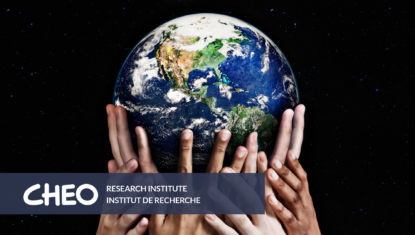22/04/2022
Ottawa, Ontario — Friday April 22, 2022

Heatwaves. Floods. Droughts. Wildfires. Record breaking snowfalls.
Extreme weather is happening at an increasing frequency, intensity, and duration. Its impact on human physical and mental health cannot be denied. Understanding the impacts of climate change on human health is a complex process and currently nations struggle to identify regions where climate change will disproportionately affect human health. This is vital information to have for strategic resource allocation of climate adaptation funds to where they are most needed.
To help tackle this issue, the Wellcome Trust has awarded $8.2 million to the UK National Office of Statistics for a project to develop a framework for monitoring climate risks to human health at a regional level. This will help governments create evidence-based policies and better distribute climate adaptation funds to local regions, weighted by the predicted impact on human health in those specific areas.

Dr. Richard Webster, Investigator at the CHEO Research Institute and Data Science Team Lead at CHEO’s Clinical Research Unit, is a collaborator on this important work. He has been awarded $250,000 to perform a scoping review on the impacts of climate change on human health and assist with data synthesis with the Cochrane Climate-Health Working Group.
“Climate change impacts are here to stay. We are already locked into some effects on human health. It is vital that climate adaptation funds are distributed equitably. By forecasting the effects on human health, we can better help vulnerable communities prepare for future risks,” said Dr. Webster.
Beyond this grant, Dr. Webster recently published an editorial on sustainable healthcare and has been awarded the 2021 CHEO Popham Fellowship to create a net-zero strategy for CHEO.
Canadian healthcare contributes approximately 5% of Canada’s carbon emissions. As we tackle climate change, it is important to explore how the vital clinical care we need today can be better delivered without putting our future health at risk.
“A barrier to decarbonizing our healthcare system is the lack of an easy-to-understand map of the sources of healthcare’s carbon emissions. Without an understanding of the sources of carbon within an organization, decision makers struggle to take their first meaningful steps towards reducing carbon emissions,” said Dr. Webster.
To achieve net-zero targets, large financial investments are required by healthcare organizations. In order to give decision makers the clear business case and the confidence required to make these investments, key performance indicators (KPIs) are needed.
“My research aims to make innovative tools to improve carbon foot printing for hospitals and make the journey to a greening future achievable. Together we can build a greener future,” said Dr. Webster.
Media Contact:
Jennifer Ruff
Manager of Communications
CHEO Research Institute
(613) 261-3979
[email protected]
